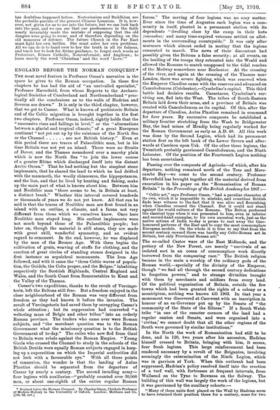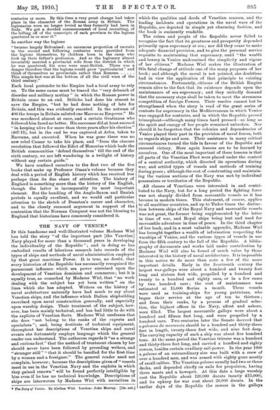ENGLAND BEFORE THE NORMAN CONQUEST.* THE most novel feature in
Professor Oman's narrative is the space he gives to the Roman occupation. In these five chapters he has had the aid of "an unrivalled specialist," Professor Haverfield, from whose Reports to the Archaeo- logical Societies of Cumberland and Northumberland " prac- tically all the conclusions as to the walls of Hadrian and Severus are drawn." It is only in the third chapter, however, that we get to Caesar. What is known of prehistoric Britain and of the Celtic migration is brought together in the first two chapters. Professor Oman, indeed, rightly holds that the " successive rises and fallings in level," or the " alternations between a glacial and tropical climate," of a great European continent "not yet cut up by the existence of the North Sea or the Channel are not British history." Even at this period there are traces of Palaeolithic man, but in his time Britain was not yet an island. There were no Straits of Dover, and the Thames meandered over a marshy plain which is now the North Sea " to join the lower course of a greater Rhine which discharged itself into the distant Arctic Ocean." That he had nothing but the simplest stone implements, that he shared the land to which he had drifted with the mammoth, the woolly rhinoceros, the hippopotamus, and the lion, and that he lived by hunting and fishing, make up the main part of what is known about him. Between him and Neolithic man "there seems to be, in Britain at least, a distinct break." Whether this interval covered hundreds or thousands of years we do not yet know. All that can be said is that the traces of Neolithic man are first found in an island with an outline, a climate, and a fauna not very different from those which we ourselves know. Once here Neolithic man stayed long. His earliest implements were not much beyond those of the Palaeolithic people; but later on, though the material is still atone, they are made with great skill, wonderful symmetry, and an evident regard to ornament. In the end, however, he was displaced by the men of the Bronze Age. With them begins the cultivation of grain, weaving of stuffs for clothing, and the erection of great circles of standing stones designed in the first instance as sepulchral monuments. The Iron Age followed, and with it came the "three Celtic waves of popula- tion, the Goidels, the Celts proper, and the Belgae," inhabiting respectively the Scottish Highlands, Central England and Wales, and the South Coast from Somersetshire to Bent and the Valley of the Thames.
Caesar's two expeditions, thanks to the revolt of Vercinge- torix, left the Britons still free. But a freedom enjoyed in the close neighbourhood of the Roman was very different from freedom as they had known it before the invasion. The revolt of Vercingetorix had saved them by occupying Caesar's whole attention ; but its suppression had converted "a weltering mass of Belgic and other tribes" into an orderly Roman province. The traders who came over were Roman subjects, and " the merchant question was to the Roman Government what the missionary question is to the British Government of to-day." The exiles who now fled from Gaul to Britain were rebels against the Roman Empire. "Young Gauls who crossed the Channel to study in the schools of the British Druids were equally Roman subjects engaged in keep- ing up a superstition on which the Imperial authorities did not look with a favourable eye." With all these points of connexion, the wonder is that the landing of Aulus Plautius should be separated from the departure of Caesar by nearly a century. The second invading army— four legions with auxiliaries—" probably counted over 30,000 men, or about one-eighth of the entire regular Roman
• England before the Norman Conquest. By Charles Oman, Chichele Professor of Modern History in the University of Oxford. London : Methuen and Co. [les. 6d. net.]
forces." The moving of four legions was no easy matter.
Ever since the time of Augustus each legion was a com- munity in itself, planted in a permanent station with its
dependents " dwelling close by the camp in their huts (cannabae) and many time-expired veterans settled on allot- ments in the surrounding countryside?' It was only after murmurs which almost ended in mutiny that the legions consented to march. The news of their discontent had
possibly given the Britons a false security; at all events, on the landing of the troops they retreated into the Weald and allowed the Romans to march unopposed to the tidal reaches of the Medway somewhere near Rochester. At the crossing of the river, and again at the crossing of the Thames near London, there was severe fighting, which was renewed when the Emperor Claudius came with the reserves and advanced on Camulodunum (Colchester),—Cymbeline's capital. This third battle had decisive results. Caractacus, Cymbeline's sur- viving son, fled into the West. The tribes of South-Eastern Britain laid down their arms, and a province of Britain was created with Camulodunum as its capital. Of this, after the departure of Claudius, Aulus Plautius remained in command
for four years. By successive conquests he established a military frontier stretching from the Wash to Bridgewater
Bay, the lead mines of Mendip being regularly worked for the Roman Government as early as A.D. 49. All this work was done by the Second Legion, which had its permanent station first on the left bank of the Lower Severn and after- wards at Caerleon upon Usk. Of the other three legions, the Twentieth probably garrisoned Camulodunum, and the Ninth Leicester. Of the position of the Fourteenth Legion nothing has been ascertained.
Passing over the conquests of Agricola—of which, after his departure, nothing remained north of the Tees and More- cambe Bay—we come to the second century. Professor Haverfield has brought together all the material derived from excavation in his paper on the " Romanisation of Roman Britain" in the Proceedings of the British Academy for 1907 :— " Celtic art," says Professor Oman, " had a peculiar character of its own, which it is impossible to mistake, and countless British finds bear witness to the fact that it was alive and flourishing when Claudius crossed the Channel. But it could not stand against the world culture of the Romans. The Briton preferred the classical type when it was presented to him, even in inferior and second-hand examples, to bis own ancestral work, just as the native artisan of India to-day is prone to cast away the time- honoured patterns of the East and to copy the most commonplace European models. On the whole it is true to say that from the second century onward there was hardly any Celto-Roman art in Britain, but only Provincial Roman art."
The so-called Castor ware of the East Midlands, and the pottery of the New Forest, are merely " survivals of an
isolated sort in an ocean of commonplace work directly borrowed from the conquering race." The British religion became in the main a worship of the ordinary gods of the Roman world,—specially of the divinity of the Emperor, though " we find all through the second century dedications to forgotten powers," and to strange divinities brought with them by merchants and soldiers from every land. Of the political organisation of Britain, outside the few
towns which had been granted the rights of a colony or a municipium, nothing was known till 1903. In that year a
monument was discovered at Caerwent with an inscription in honour of an ex-Governor put up by the Senate of " the community of the State of the Silures." If a South Welsh tribe "in one of the remoter corners of the land had a regular canton and Senate, and were organised into a eivitas,' we cannot doubt that all the other regions of the South were governed by similar institutions."
In the North the work of Romanisation had still to be done, and in 120, two years after his accession, Hadrian himself crossed to Britain, bringing with him, it seems, four fresh legions. This large reinforcement had been rendered necessary by a revolt of the Brigantes, involving seemingly the extermination of the Ninth Legion, which was in garrison at York. When this outbreak had been suppressed, Hadrian's policy resolved itself into the erection of a turf wall, with fortresses at frequent intervals, from Wallsend on the Tyne to Bowness on the Solway. The building of this wall was largely the work of the legions, but it was garrisoned by the auxiliary cohorts :—
"Many of these units first placed on the Wall by Hadrian seem to have retained their position there for a century, some for two centuries or more. By this time a very great change had taken place in the character of the Roman army in Britain. The legionaries were no longer levied as they formerly had been in Italy. We get a decided commencement of local recruiting, of the telling off of the conscripts of each province to the legions quartered in or near it."
In another way the legions
" became largely Britonised : an enormous proportion of recruits in the second and following centuries were provided from the legions themselves, by children born in the camp who took up their father's profession. And as the legionary almost invariably married a provincial wife from the district in which he was quartered, his sons were semi-British. There was a danger therefore that the legions would grow particularist' and think of themselves as provincials rather than Romans This simple fact was at the bottom of all the civil wars of the third century."
Each local pretender to the Empire had a local army to rely on. To the same cause must be traced the " very debauch of disorder and military mutiny " in which the Roman power in Britain came to an end. Stilicho had done his utmost to save the Empire, "but he bad done nothing of late for Britain, and this was evidently resented. In the autumn of 406 the troops in Britain saluted one Marcus as Emperor." He was murdered almost at once, and a certain Gratianus who followed him fared no better. His successor did at least succeed " in keeping alive for more than three years after his election" (407-11), but in the end he was captured at Arles, taken to Ravenna, and executed. When he was gone there was no new rebel Caesar to take his place, and " from the obscure revolution that followed the Edict of Honoring which bade the British communities defend themselves' till the end of the sixth century, we are left wandering in a twilight of history without any certain guide."
- We have confined ourselves to the first two of the five books that make up Professor Oman's volume because they deal with a period of English history which has received less perhaps than its due share of attention. The history of England is something more than the history of the English, though the latter is incomparably its moat important element. But the handling of the Anglo-Saxon and Danish periods is equally excellent, and we would call particular attention to the sketch of Dunatan's career and character, and to the closely reasoned argument in support of the contention that the Norman Conquest was not the blessing to England that historians have commonly considered it.















































 Previous page
Previous page